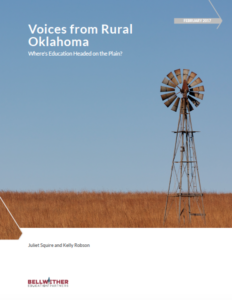Should schools push all students to go to college or are alternatives like career and technical education (CTE) appropriate? The debate is far from settled. As the “college for all” mantra has taken hold over the last decade, CTE has gotten a bad rap as a dumping ground for underachieving kids. But critics of “college for all” point out that, done well, CTE can motivate students and help them build skills needed in the labor market. Nowhere is this debate more salient than in America’s rural schools.
For a recent report, Voices from Rural Oklahoma, Juliet Squire and I spent two weeks traveling throughout Oklahoma, conducting focus groups with members of r ural communities across the state. We covered a lot of ground in these conversations, touching on issues like education funding, high school students’ course options, post-high school opportunities, and school consolidation. In each and every focus group, participants conveyed uncertainty and disagreement about what Oklahoma’s rural schools ought to be preparing students to do once they graduate.
ural communities across the state. We covered a lot of ground in these conversations, touching on issues like education funding, high school students’ course options, post-high school opportunities, and school consolidation. In each and every focus group, participants conveyed uncertainty and disagreement about what Oklahoma’s rural schools ought to be preparing students to do once they graduate.
In some cases, aversion to “college for all” was rooted in fear — fear that sending kids away to school would mean they wouldn’t return home, thus hurting their communities. There is evidence that suggests this does happen, that it is often the best and brightest that leave rural areas, leaving behind those with less education who are less prepared to help their communities prosper. A participant in one of our focus groups explained it this way: “If you drive them to college, they may have to go to Kansas City…You know, you’re setting them up to go away [rather than] return and develop our economy.”
Other participants’ views about about the necessity of higher education were shaped by the realities of their communities. We heard many stories about families who needed a welder or a plumber or an electrician — but none exist in their communities. In others, high school graduates working in the oil fields or wind farms were able to make a real, living wage without higher education. One participant told us: “A large percentage of our kids need to have a trade — be it carpentry, welding, plumbing, heat and air — ‘cause I know in our area, we don’t have enough of any of those.”
But these stories were far from universal. We also heard from parents desperate to send their kids to college, a desire stemming from their own struggle securing employment. One participant told us his story:
Just from my experience, I’ve been a welder for 16 years. I’m currently unemployed because of the market falling, bottom falling plum out of it. My boy, since he was big enough to follow me around, was putting my welding hood on. And I tell him, “You better get an education.” […] My dad grew up doing construction. I grew up doing welding. That’s no longer — not going to be available for very much longer. So education is very high and especially with us, you know, I’m telling my kids, “You got to get an education. You got to go to college.”
The economic realities of rural communities have changed significantly in recent decades, and in Oklahoma they fluctuate with the volatility in oil and gas markets. Community members may know well what skills and education credentials are necessary to get a job in their small town. But they have less information about what is needed to be employable in a different city or state, and even less understanding of the skills and knowledge that will be needed ten years from now.
Thankfully, rural communities don’t need to choose between “college for all” and high-quality CTE. Instead, state policymakers, business leaders, and education leaders can work together to help students and families understand and navigate their options. This includes listening to and accounting for the perspectives of students and parents, as we sought to do in our report. But it also involves a broader understanding of where the economy is, where it’s headed, and what skills and education will be necessary for students to thrive. With thoughtful coordination among the various actors and decision-makers in rural communities, students and families can be better positioned to make informed decisions about their educations and careers.
